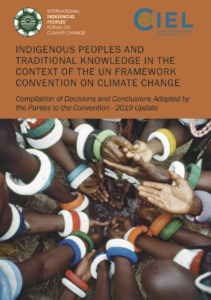
Even though Indigenous Peoples contribute little to greenhouse gas emissions, owing to their dependence upon and close relationship with the environment and its resources, they are among the first to face the direct consequences of climate change in all areas of the world. To make matters worse, climate policies often further undermine the rights of Indigenous Peoples by imposing new restrictions on their relations with natural ecosystems or by leading to forceful relocations motivated by energy or infrastructure projects. At the same time, because of their close relationship with their supportive ecosystems, Indigenous Peoples have acquired unique knowledge enabling them to understand, interpret, and react to the impacts of climate change.
Indigenous Peoples and Traditional Knowledge in the Context of the UN Framework Convention on Climate Change – 2019 Update lists all of the references to Indigenous Peoples and traditional knowledge adopted by the UNFCCC bodies — serving as a useful tool for all actors involved in climate policies and climate actions, including governments, private corporations, and financial institutions.
